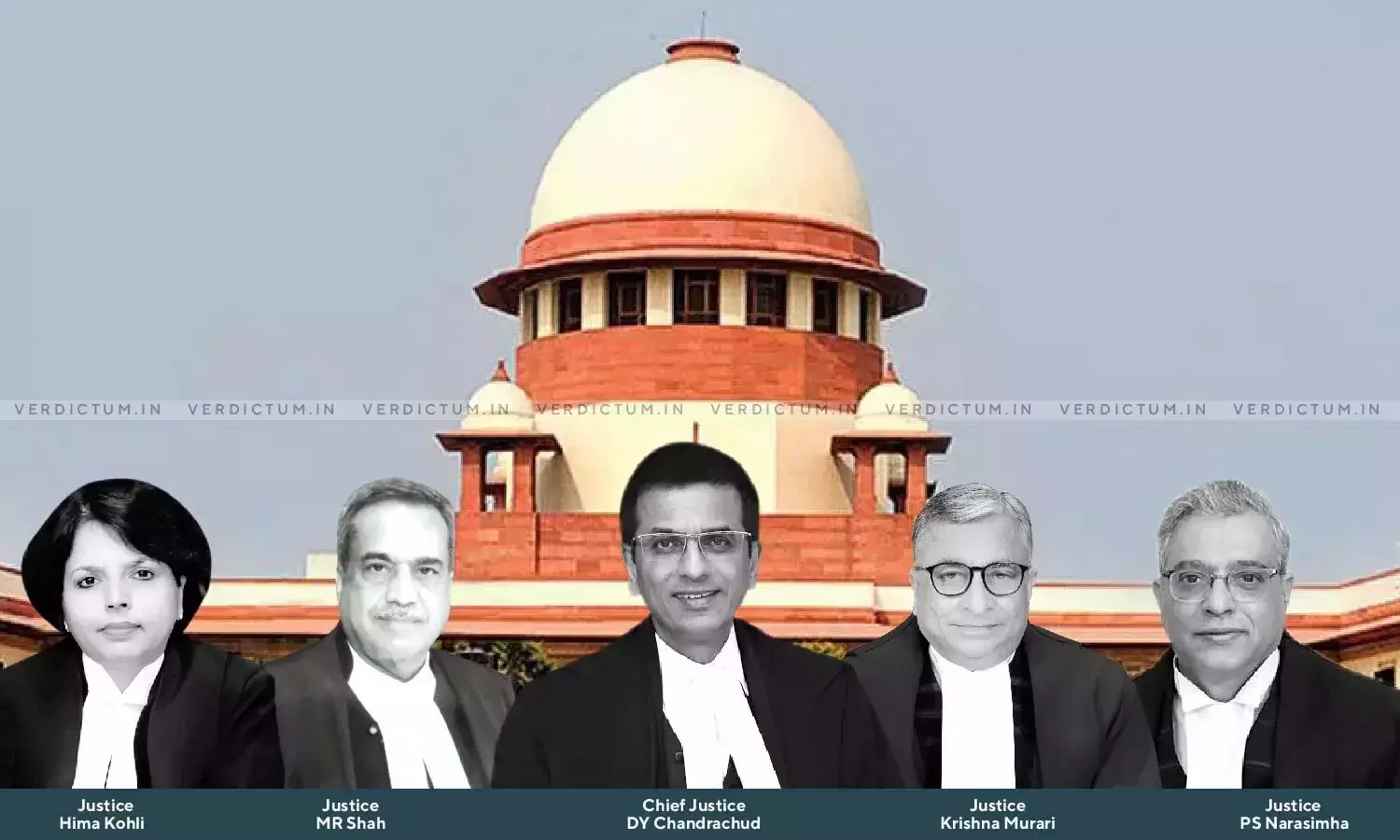Could Have Considered Reinstating Uddhav Govt Had He Not Resigned As CM- SC Constitution Bench Observes In Shiv Sena Case

A Supreme Court Bench of Chief Justice Dr DY Chandrachud, Justice MR Shah, Justice Krishna Murari, Justice Hima Kohli and Justice PS Narasimha has heard a matter pertaining to the Shiv Sena party split between the Eknath Shinde and Uddhav Thackeray factions, which, in 2022, led to a huge political crisis in Maharashtra, and further led to a change in the State Government.
The Apex Court has held that it cannot quash the resignation letter of Thackeray and that the Governor was justified in inviting Eknath Shinde to form the Government.
In that context, it was said that "Mr. Thackeray did not face the floor test on 30 June 2022 and instead submitted his resignation. This Court cannot quash a resignation that has been submitted voluntarily. Had Mr. Thackeray refrained from resigning from the post of the Chief Minister, this Court could have considered the grant of the remedy of reinstating the government headed by him".
Senior Counsel Kapil Sibal, Senior Counsel Dr Abhishek Manu Singhvi, and Senior Counsel Devadatt Kamat advanced submissions for the petitioners. Subhash Desai vs Principal Secretary, Governor of Maharashtra & Ors. Their submissions were opposed by Senior Counsel Harish Salve, Senior Counsel Neeraj Kishan Kaul, Senior Counsel Mahesh Jethmalani, Senior Counsel Maninder Singh and Senior Counsel Siddharth Bhatnagar. SG Tushar Mehta appeared on behalf of the Governor of the State of Maharashtra.
In this case, both sides of the faction filed petitions over multiple issues. These included:
1) The Eknath Shinde faction challenged the notices issued by the then Deputy Speaker against the rebels under the 10th schedule of the Constitution of India over the alleged act of defection.
2) The Uddhav Thackeray faction challenged the decision of the Maharashtra Governor to call for a trust vote. The faction also challenged the alleged illegal swearing-in of Eknath Shinde as Chief Minister of the State.
Subsequently, the Court conclusively observed that:
a) The correctness of the Judgment passed in Nabam Rebia & Bamang Felix vs. Deputy Speaker, Arunachal Pradesh Legislative Assembly must be referred to a larger Bench of seven judges;
b) The Apex Court cannot ordinarily adjudicate petitions for disqualification under the Tenth Schedule in the first instance. No extraordinary circumstances in the instant case warrant the exercise of jurisdiction by this Court to adjudicate disqualification petitions. The Speaker must decide on disqualification petitions within a reasonable period;
c) An MLA has the right to participate in the proceedings of the House regardless of the pendency of any petitions for their disqualification. The validity of the proceedings of the House in the interregnum is not “subject to” the outcome of the disqualification petitions;
d) The political party, not the legislature party, appoints the Whip and the Party Leader in the House. Further, the direction to vote in a particular manner or abstain from voting is issued by the political party, not the legislature party. The decision of the Speaker as communicated by the Deputy Secretary to the Maharashtra Legislative Assembly dated 3 July 2022 is contrary to law. The Speaker shall recognize the Whip and the Leader who are duly authorised by the Shiv Sena political party with reference to the provisions of the party constitution, after conducting an enquiry in this regard and in keeping with the principles discussed in this judgement;
e) The Speaker and the ECI are empowered to concurrently adjudicate on the petitions before them under the Tenth Schedule and under Paragraph 15 of the Symbols Order respectively;
f) While adjudicating petitions under Paragraph 15 of the Symbols Order, the ECI may apply a test that is best suited to the facts and circumstances of the case before it;
g) The effect of the deletion of Paragraph 3 of the Tenth Schedule is that the defence of ‘split’ is no longer available to members facing disqualification proceedings. The Speaker would prima facie determine who the political party is for the purpose of adjudicating disqualification petitions under Paragraph 2(1) of the Tenth Schedule, where two or more factions claim to be that political party;
h) The Governor was not justified in calling upon Mr. Thackeray to prove his majority on the floor of the House because he did not have reasons based on objective material before him, to reach the conclusion that Mr. Thackeray had lost the confidence of the House. However, the status quo ante cannot be restored because Mr. Thackeray did not face the floor test and tendered his resignation; and
i) The Governor was justified in inviting Mr. Shinde to form the government.
In light of the same, the batch of petitions was disposed.
Cause Title: Subhash Desai vs Principal Secretary, Governor of Maharashtra & Ors.
Click here to read/download the Judgment

